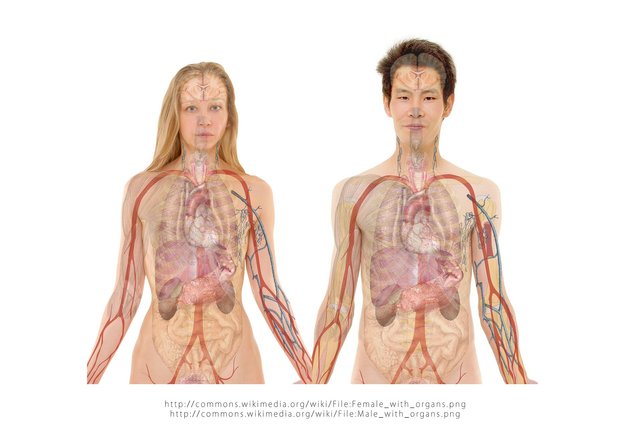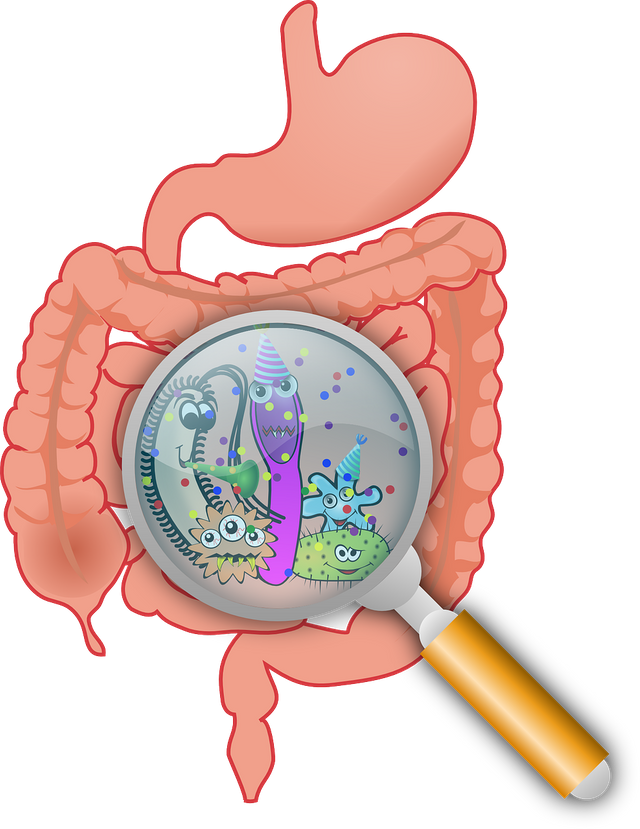Medicine studies Microbiota [featuring Saifer87]
I have read that this year the intestinal flu will affect many people and since I have suffered enough from the intestine and stomach, I have not resisted reading and informing me about this article where it explains even if in a scientific way the importance of the bacteria in the Human Body..
The intestine is not the only one to work on the digestion of food for the body: it helps a population of microbes that performs metabolic and nutritional activities, has a protective function and stimulates the immune response to the attack of pathogens resident or arrived from the outside. All the micro-organisms of the intestine, partly autochthonous and partly of environmental origin, are part of the so-called microbiota, that is the whole of all the microbes that live inside and on the surface of our body: their number is 10 times that of our cells, which are about 10 trillion.

In the human intestine there is the so-called intestinal microbiota, a subset of the more general microbiota, but certainly the richest and most important. It weighs about 1 kilogram and a half and consists of about 500 different species of bacteria, divided into 45 genera and 14 families: some are very useful, such as Bacteroides thetaiotaomicron, which greatly increases the body’s ability to metabolize carbohydrates, while others they can become harmful, such as the Clostridium difficile, whose action is generally controlled by the presence of other microbes, but which in some cases can cause diarrhea and fever.
The population of “good” microbes in the intestine (which are the great majority), among other things, protects the host, that is the man, producing the mucus that acts as a barrier between the microorganisms and the cells that form the walls of the ‘intestine. It also stimulates the inflammatory response and the immune defenses in the case of an attack on our body.
For these reasons, the microbiome has become a field of extreme interest for all medicine, because unlike some factors that are not modifiable and which affect the onset of diseases – such as age and genetics – it is possible to modify the microbiome. At least in theory.
In 2010, a study carried out by some researchers of the Meyer Hospital and the Department of Pharmacology of the University of Florence revealed that some children of Burkina Faso, accustomed to an almost vegetarian diet and very rich in fiber, have a population of microbes much richer and varied than that contained in the intestine of the Florentine peers, used to eat sugars, fats, meat and many less fiber. And that the former suffer much less than the latter of non-communicable autoimmune diseases.
EXTINCT FOR EVERYWHERE. The discovery of Florentine researchers and other scientists who are studying the intestinal microbiota (and its genome, called microbiome), would also demonstrate that there is a close correlation between what we eat, the microbes that inhabit the intestine and our state of health . A diet rich in fiber, similar to that of the children of Burkina Faso, is certainly closer to that of man: before the industrial era, in fact, our species has nourished for millennia of vegetables and (little) game .This type of diet would give rise to a greater biodiversity of the microbiota: in the intestine of the populations of “natives” still present on the planet were found 50 percent more species of microbes than those contained in the abdomen of North Americans and Europeans . Would it be enough to change diet and start eating high-fiber foods (legumes, whole grains, fruit, vegetables) to repopulate our gut of lost species? It is not exactly like this: a lifestyle change stimulates an enrichment of the microbiota, in quantity and diversity of microorganisms, but it is not able to make us recover species that were not already present in our organism at birth.
With an experiment conducted on mice and performed at the University of Stanford’s Sonnenburg Lab, it has been verified that the microbes that have disappeared from the mother’s intestine due to a “western” diet are definitively extinct in the intestine of the child immediately after the childbirth. Many microorganisms, in fact, pass to the newborn through contacts with the skin, the nipples and the mother’s lips. And if mum does not own them, transmission can not take place.
MICROBI TRANSPLANTATION. Other factors contributing to progress were contributing to this process of microbial extinction in Western man: for example, urbanization and thus the removal from agricultural land and livestock (suppliers of a greater variety of micro-organisms), and use of antibiotics, capable of killing most of the microflora. Processes with such irreversible effects that some scientists think that the only possible way to recreate in the abdomen of civilized men a microbiota similar to that of the native peoples (healthier) is to save the microbes at risk of extinction in a sort of biological “Noah’s Ark”, and then artificially replant them in new human guests.

The impoverishment of the microbiota would be the basis of the recent spread of pathologies typical of contemporary society, such as colon cancer, autoimmune diseases, but also of obesity, of depressive pathologies and anxiety disorders. According to research by the US microbiologist Justin Sonnenburg, when our diet is depleted of fiber, the bacteria accustomed to metabolize, not finding more available, attack the mucus that protects the intestine from other microbes and the latter, coming in contact with the intestinal cells, cause inflammation.
As I understood it would be the chronic inflammation caused by the wrong diet and the consequent thinning of the protective mucus to trigger the “western” pathologies (after all, almost completely unknown to the fiber-eating tribes). A more frugal diet, on the contrary, would stimulate the bacteria to produce chemical compounds useful to the body, such as butyrate (which is also found in aged cheeses), according to the researchers able to protect us against certain diseases such as Chron’s disease, thanks to its anti-inflammatory power.
img source Pixabay
Saifer link

To listen to the audio version of this article click on the play image.

Brought to you by @tts. If you find it useful please consider upvoting this reply.